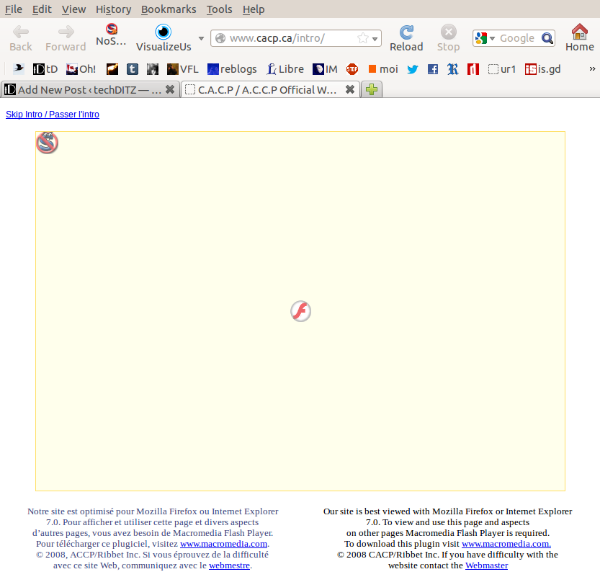Tonight I was listening to a terrific song, and so I posted it to the Fediverse group !Listening, one of the first groups I joined on Identica in 2009. Way back then, I was told the proper netiquette when announcing the name of the song you are listening to is to link to the song. That way anyone who was curious can listen to the song as well.
I discovered Ranee Lee when I bought a couple of albums from her at the Uptown Waterloo Jazz Festival last year. She was amazing. Sadly, her music isn’t released under a free culture license, so when I went looking for a link my options were limited. I tried a few of the links that offered the song, but was unable to play it on any of them.
This might be because I use Free Software and so don’t have Adobe Flash installed, or maybe because I use NoScript, Ad Block and Ghostery for security. The only link I could get to play the song was the one on Amazon. I don’t link to sites that only give partial song previews, but this was the only website where the song would play. So I posted:
!Listening to Ranee Lee “When A Woman Loves A Man” http://ur1.ca/g05sq !amwriting !NaNo
I was surprised to find myself attacked for posting this. This is not the first time I have been attacked online by someone who I hadn’t realized was an enemy.
what was the attack?
I don’t understand why someone who claims to care about privacy would link to amazon.
It doesn’t look like much of an attack, does it? But that’s the point. It almost sounds reasonable.
Until you look at the language.
The phrase “someone who claims” implies that the claim is dishonest.
By taking a step further, saying “someone who claims to care about privacy” he passes judgement. This is a statement that I am lying about what I care about.
“I don’t understand why someone who claims to care about privacy would link to amazon” says that because I posted a link to amazon I must be lying about caring about privacy. It is an attack, all right.
What did I do wrong?
Perhaps I shouldn’t have used a URL shortener.
Maybe I shouldn’t have posted at all?
But it isn’t as if I posted the link to the !Privacy group.
But it isn’t what I did at all, really.
On the basis of one link, he has cast aspersions on anything and everything I have said about privacy online. He also maligns my personal credibility.
What gives him the right to tell me what I care about?
He has no more right to decide what I care about than I have the right to decide what his favourite colour is, or what hand he writes with. He is entitled to disagree with my choices but certainly doesn’t have the right to use them as the basis of an ad hominem attack.
Privacy is a huge issue, and trying to maintain privacy online is not an easy thing to do. We are assailed on all sides. Certainly amazon has issues, but pretty nearly every website on the Internet has issues. Particularly now that the Snowden revelations have made it clear that the Internet is under surveillance 24/7
Everything we do on the Internet has a cost in privacy.
Even before we heard about Prism, someone I know refused to use the Internet at all, ever, because that was the only way to be sure to avoid Internet surveillance. I know other people who use the Internet sparingly, but never in their own homes, just as I know people who post their most personal information on Facebook.
Adults get to decide for ourselves what we are comfortable doing. We need to make informed choice: we make our own decisions about how we will live our lives. In a free country, other adults don’t have the right to decide for us.
What gives him the right to decide that posting a link to amazon negates any concerns I have about privacy?
I answered his ostensible question with a question:
How can you possibly care about privacy if you use the Internet?:
His answer was
If that’s your justification, then you shouldn’t take issue with anything related to privacy.
Why does he think I need to justify myself to him?
Even if I had made some horrific inadvertent privacy gaffe, it would not then deprive me of the right to “take issue with anything related to privacy.”
Poppycock. Suggesting that is as illogical as saying if I loan someone my car, I can’t complain if they burn my house down.
I often have strong opinions, and I am not hesitant about voicing them. One valuable thing I learned growing up in a large family is that discussion and argument can inform; I have been known to change my opinion when shown another side or proven wrong. I have been told some men have trouble with women with opinions. Over the years, there have been instances of people attacking me online. When this has happened in the past, I’ve tried to resolve things through discussion. But sometimes that isn’t possible.
bullying
Ironically, not so long ago someone asked me if the person who attacked me just now was an Internet troll, and at the time I said no, we were just having a discussion. Apparently I was wrong.
Sometimes people just don’t like you. Nothing you say will change it. Nothing you do will make you friends.
And of course, sometimes people just attack you because.
There doesn’t have to be a reason.
He might be bullied because he’s too smart, or not smart enough, she might be bullied because she’s too tall or too short. That’s how bullying works.
The ostensible reason for bullying isn’t actually a reason, its an excuse. Rational arguments just bounce off when someone is determined to attack you.
Apparently it is very easy to bully people online. The consequences have been fairly horrific in some cases, but mostly it is comparatively mild — unless of course you are the person being bullied.
The fediverse is largely peopled by tech folks at this point. Mostly men at present. Thinking back, I’ve probably had one or two of this type of attack a year. I’m wondering how many of the women that used to be regulars there have disappeared precisely because of this type of attack? A growing number of people I speak with on Twitter — mostly women — block the people who harass them, or “protect their tweets.”
If the bullies have a problem with women in general or me in particular, they don’t have to stick around in the places I frequent. They can leave.
Dear Bullies:
If you don’t like me, send me a message and I’ll make sure to unsubscribe from your feed, and I certainly won’t go so far as to converse with you any more.
Because I am not going to change. I am not going anywhere. I will continue my online activities, including posting to Fediverse groups I belong to, like Privacy and Listening. If you have a problem with this, go somewhere else.
Feel free to leave the groups I am in. Start your own groups; I won’t join.
Sincerely,
Laurel
Help Stop Bullying
One of the best ways to stop bullying is to speak against it when you see it.
If you see someone being bullied, stick up for them.
If you don’t, they might not stick around.
And then your world will be that much smaller.
Image Credit:
The American government’s creative works, like the pictured War Propaganda Poster “Quiet” are released directly into the public domain.




